August 12, 2024
How to Be More Sustainable & Upcycling Ideas for Pet Owners
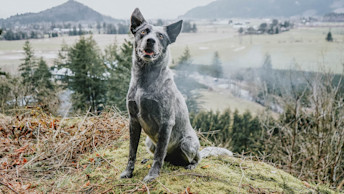
Most of us are more aware than ever before of how to be more sustainable and reduce the impact we have on the environment. But have you stopped to consider the impact your dog has on the planet and the size of the pawprint your dog is leaving behind? Read on for our tips and upcycling ideas for pet parents.
Use Compostable Poop Bags
You may think that Fido’s poop is completely natural so why bother to pick it up – it will eventually just become part of the soil or the rain will just wash it away – right? The problem is dog feces can be harmful to the environment. It can carry disease and pollute waterways so pick up your pet’s poop, even if it’s in an area where people typically don’t walk.
When it comes to poop picker-uppers, use compostable bags. Regular plastic bags take years and years to break down, if ever. There are more options than ever before for bags that will decompose, such as bags made from plants and other materials.
If your municipal compost facility doesn’t accept pet poop, poop bags made from post-consumer recycled plastic are another great option. These poop bags give a second life to more than 5 million pounds of landfill-bound plastic each year.
Bonus good karma points if you pick up poop left behind from someone else’s pet.
Look for Pet Products with Sustainability Certifications
Certifications on the packaging for pet food, toys, accessories, etc. can help you quickly identify ingredients or materials that have met rigorous sustainability criteria. An example is the Marine Stewardship Council (MSC) certification which requires fishing operations to meet very strict criteria to preserve the ecosystem.
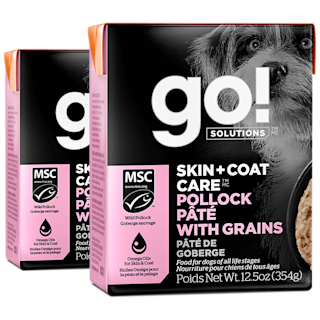
Recommended Solution
Skin + Coat Care Pollock Pâté With Grains For Dogs
Carefully prepared with MSC-certified wild Alaskan pollock as a sustainable source of omega-3 oils to help maintain healthy skin and a shiny coat.
View recipe
Choose Sustainable Dog Food + Cat Food Made with Upcycled Ingredients
Upcycled ingredients come from all corners of the food world. Take misshapen produce, for example. Those quirky carrots or oddly shaped apples may not make the cut for the grocery store shelf, but they've got all the flavor and nutrients your dog could ask for3.
Roughly one fifth of the world's food goes uneaten1. That's a lot of perfectly good food going to waste, not to mention the resources used to produce it. By choosing products made with upcycled ingredients, you're supporting companies that are committed to building a more circular economy, where waste is minimized, and resources are reused and repurposed. When shopping for sustainable pet foods, look for products that feature the Upcycled Certified logo.
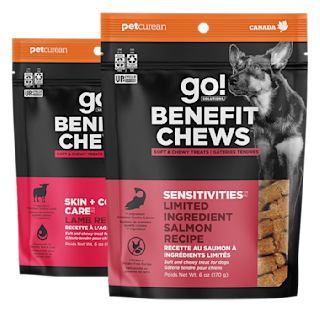
Recommended Solution
Dog Treats Made with Upcycled Ingredients
Treat your pup to Go! Solutions Benefit Chews. Soft and chewy dog treats made with upcycled ingredients to reduce waste.
View dog treats
Purchase Toys Made Sustainably or Make Your Own Using Existing Materials!
Dogs, like little kids, are constantly putting things in their mouths so it’s best to look for toys made from non-toxic materials. Many companies now are making eco-friendly pet toys from recyclable or recycled materials, or earth-friendly fabrics like hemp and other natural fibers.
Really try to limit toys made from plastic which can end up in landfills where they’ll never decompose. And since dogs (and cats!) tend to get bored easily of toys, consider donating gently used toys to your local animal rescue. The toys will get a much longer life and you’ll bring joy to an animal waiting for its forever home.
Tempted by the latest electronic gadget to amuse your pet? Try to resist. Just because you’re wowed, doesn’t mean your pet will be. And these digital toys have a high environmental cost – from the plastic used to make them, to the electricity demand used to manufacture them. Instead stick with the tried-and-true toys like chews and balls which minimize wasteful power usage.
And of course - reuse! Tie old t-shirts into knots to make pull toys for dogs. Or consider a toy swap with friends who have pets. People do this with kids’ toys – why not also do it for pets’ toys?!
Feed Your Pet with Foods Using Sustainable Proteins
Consider the type of animal protein in your pet’s food and the environmental impact of how that animal was raised in the animal production industry. Alternative proteins like insect or plant-based proteins for dogs are great for the environment! Insect protein uses 80% less land and water to produce than traditional proteins used in pet food. Poultry generally has the lowest impact of the animal proteins2.
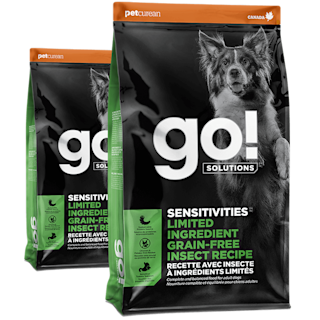
Recommended Solution
Go! Sensitivities Limited Ingredient Grain-Free Insect Dog Food
Carefully prepared with all the nutrients your dog needs, featuring sustainable insect protein that uses 90% less water and land compared to chicken.
View recipe
Choose Pet Food in Recyclable Packaging
Are dog food bags recyclable? Some sustainably-minded pet food companies are now using bags and cartons that can be recycled at store drop-off locations, your local recycling depot, or even curbside in some communities – check with your local municipality. Look for the HowToRecycle logo on the bag to know if your pet’s food bags can be recycled!
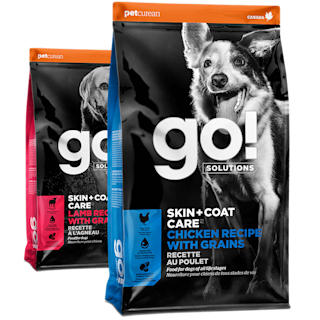
Recommended Solution
Dog Food in Recyclable Packaging
Our recyclable pet food packaging, from environmentally friendly bags to FSC-certified Tetra Pak® cartons, set the standard for sustainable dog food packaging.
Dog food in recyclable packaging
For packaging that can’t be recycled, we have some creative ideas on how you can upcycle your dog food bags to give them new life!
What is Upcycling?
Upcycling is the process of transforming waste materials or unwanted products into something new. It involves taking something that would otherwise be discarded and giving it a new life and purpose, increasing its value.
For pet owners, upcycling is particularly important because it helps reduce the environmental impact of pet food products. Many of these items are made from non-recyclable plastic or other materials that can take hundreds of years to decompose in landfills. By upcycling, pet owners can not only reduce waste but also create useful and cost-effective items.
How to Reuse or Upcycle Dog Food Bags
If you're a pet parent, then chances are you have a stash of non-recyclable dog food bags piling up in a closet somewhere. Instead of tossing them in the trash, there are countless ways for upcycling dog food bags for functional, everyday use.
Gardening Bags
These upcycling ideas are both eco-friendly and cost-effective. The thick plastic material of dog food bags makes them ideal for collecting leaves, since the bags easily stand up on their own. Also, the thickness and durability of dry dog food bags make them great for garden waste which may be thorny or contain sharp ends. Additionally, their resealable tops help contain any unpleasant odors that may arise from decomposing organic material.
Weed Blocking Plastic
The thick, durable plastic of these bags can effectively smother weeds and prevent their growth, saving you time and effort in maintaining your garden beds. Just lay the bags flat on the soil in your garden beds, overlapping the edges to create a continuous barrier. You can either leave them as is or cover them with a layer of mulch or soil to weigh them down and improve their appearance.
Grow Bags for Plants
Upcycling pet food bags into grow bags is an excellent way to reduce waste while creating a cost-effective and eco-friendly solution for your gardening needs. Grow bags are ideal for growing vegetables, herbs, and even small fruits, making them a versatile choice for urban gardeners or those with limited outdoor space.
Pet Food Mats
One of the simplest and most practical ways to upcycle dog food bags is to turn them into mats for your furry friends. These durable bags can be easily cut into the perfect size for a food or water mat. Not only does this prevent messes and stains on your floor, but it also adds a pop of color and personality to your pet's dining area.
Final Thoughts
If sustainability and pet-parenting is a new combo for you, kudos for being open to new ideas! As with anything new, start small and add in one thing at a time to your lifestyle. Don’t try to take everything on at once. If you’re the poster child for sustainable pet parenting, congrats! Helping your friends who are just starting a sustainable journey with their pet is a great way to share your knowledge and will benefit everyone involved.

Sustainability goes beyond environmental concerns. It also includes how businesses are working to support the communities where they do business and throughout their supply chain. You can show support with your wallet for companies that are using their business as a force for good. Check the websites for your favorite pet food and pet accessories brands – are they giving back to their communities in meaningful ways? If not, consider switching to brands that do.
"5 Facts About Food Waste and Hunger." UN World Food Programme. June 2, 2020. https://www.wfp.org/stories/5-facts-about-food-waste-and-hunger.
"Environmental Impacts of Food." Our World in Data. Accessed July 16, 2024. https://ourworldindata.org/environmental-impacts-of-food.
Robbins, O. "What is Upcycled Food & Should You Buy It?." Food Revolution Network. November 25, 2022. https://foodrevolution.org/blog/what-is-upcycled-food/.
Upcycled Foods Definition Task Force. "Defining Upcycled Foods." Upcycled Food Association. Spring 2020. https://chlpi.org/wp-content/uploads/2013/12/Upcycled-Food_Definition.pdf.
Authors




